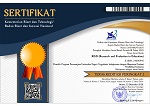Developing formative authentic assessment instruments based on learning trajectory for elementary school
DOI:
https://doi.org/10.21831/reid.v2i1.6540Keywords:
instruments of authentic assessment, formative assessment, thematic-integrative, learning trajectoryAbstract
References
Arifin, Z. (2011). Evaluasi pembelajaran [Learning evaluation]. Bandung: Rosdakarya.
Arikunto, S. (2010). Prosedur pengembangan [Developmental Procedure]. Jakarta: Rineka Cipta.
Borg, W.R. & Gall, M.D. (1983). Educational research: An introduction (4th ed.). New York, NY: Longman.
Clements, D.H. & Sarama, J. (2009). Learning and teaching early math: The Learning Trajectories approach. New York, NY: Routledge.
Fogarty, R. (2009). How to integrate the curricula. Palatine, IL: Skylight.
Frisbie, D.A. (2005). Measurement 101: Some fundamentals revisited educational measurement: Issues and practice. Fall, 24(38), 21-28.
Glatthorn, A., & Jailall, M. (2009). The principal as curriculum leader shaping what is taught and tested (3rd ed.). Thousand Oaks, CA: Corwin Press.
Gronlund, N.E., Linn, R.L., & Miller, M.D. (2009). Measurement and teaching (10th ed.). Upper Sadle River, NJ: Merril.
Guliker, J.T.M., Bastiaens, T.J., & Kirschner, P.A. (2004). A five dimensional framework for authentic assessment. Edu-cational Technology Research and Development, 52(3), 67-86.
Hosnan, M. (2014). Pendekatan saintifik dan kontekstual dalam pembelajaran abad 21 [Scientific and contextual approaches in the 21st century learning]. Bogor: Ghalia Indonesia.
Johnson, D. & Johnson R. (2002). Meaningful assessment: A management and cooperative process. Boston, MA: Allyn and Bacon.
Kubiszyn, T. & Borich, G. (2010). Educational and measurement: Classroom application and practice (9rd ed.). Hoboken, NJ: John Willey & Sons.
Kunandar. (2013). Penilaian autentik (Penilaian hasil belajar peserta didik berdasarkan Kurikulum 2013) [Authentic assessment (Assessment of learning participants' learning results based on Curriculum 2013)]. Jakarta: Rajawali Press.
Kusuma, D., Triatna, C., & Permana, J. (2011). Pendidikan Karakter [Character education]. Yogyakarta: Diandra.
Liu, M.C. & Wang, J.Y. (2010). Investigating knowledge integration in web-based thematic learning using. Journal of International Forum of Educational Technology & Society (IFETS), 13, 25-39.
Mardapi, D. (2008). Teknik penyusunan instrumen tes dan nontes [Test and non-test instrument arrangement techniques]. Yogyakarta: Mitra Cendekia.
Miller, P.W. (2008). Measurement and teaching. Munster, IN: Patrick W. Miller and Associates.
Ministry of Education and Culture. (2013). Kurikulum 2013 untuk sekolah dasar (SD)/ madrasah ibtidaiyah (MI) [Curriculum 2013 for elementary schools/ madrasah ibtidaiyah]. Jakarta: Kementerian Pendidikan dan Kebudayaan.
Mulyana, T. (2012). Pengembangan bahan ajar melalui desain penelitian [The development of lesson material through research design]. Jurnal Ilmiah Program Studi Matematika STKIP Siliwangi Bandung, 2, 21-28.
Newman, F.M., King, M.B., & Charmichael, D.L. (2007). Authentic instructional and assessment. Des Moines, IA: Grimes State of Office Building.
O'Neil, J. (1992). Outting performance assessment to the test. Educational Leadership, 49, 14-19.
Riduwan. (2013). Skala-skala pengukuran variabel [Variable measuring scales]. Bandung: Alphabeta.
Rusman. (2011). Model-model pembelajaran [Learning models]. Jakarta: Rajawali Press.
Schunk, H.D. (2012). Learning theories: An educational perspective. Boston, MA: Pearson.
Stiggins, R. J. (1994). Student classroom assessment. New York, NY: Macmillan.
Subali, B. (2012). Prinsip assessmen dan evaluasi pembelajaran [Principle of assessment and learning evaluation]. Yogyakarta: UNY Press.
Sukmadinata, N.S. (2013). Metode penelitian pendidikan [Educational research method]. Bandung: Remaja Rosdakarya.
Team of Curriculum of Professional Basic Subjects and Learning Development. (2011). Kurikulum dan pembelajaran [Curriculum and learning]. Jakarta: Rajawali Press.
Team of Educational Research Center. (2010). Analisis soal secara manual [Problem analysis manually]. Jakarta: Pusat Penilaian Pendidikan Balitbang Kemendiknas.
Van den Akker, J. (2006). Educational design research. Macmilan: Routledge.
Webb, P. & Pearson, P. (2012). Create unit and lesson planning through a thematic/integrated to teaching games for understanding (TGFU). The Journal Physical Education, 45, 17-22.
Wittek, L. (2013). The activity of writting for learning in a nursing program: Trajectories of meaning making. Sociology Journal, 14, 73-94.
Wright, R.J. (2008). Educational assessment test measurement in the age of accountability. Los Angeles, CA: Sage.
Zakaria, T.R. (2010). Pedoman penilaian sikap [Attitude assessment guidance]. Jakarta: Pusat Penilaian Pendidikan Balitbang Kemendiknas.
Downloads
Published
How to Cite
Issue
Section
Citation Check
License
The authors submitting a manuscript to this journal agree that, if accepted for publication, copyright publishing of the submission shall be assigned to REID (Research and Evaluation in Education). However, even though the journal asks for a copyright transfer, the authors retain (or are granted back) significant scholarly rights.
The copyright transfer agreement form can be downloaded here: [REID Copyright Transfer Agreement Form]
The copyright form should be signed originally and sent to the Editorial Office through email to reid.ppsuny@uny.ac.id

REID (Research and Evaluation in Education) by http://journal.uny.ac.id/index.php/reid is licensed under a Creative Commons Attribution-ShareAlike 4.0 International License.







.png)





